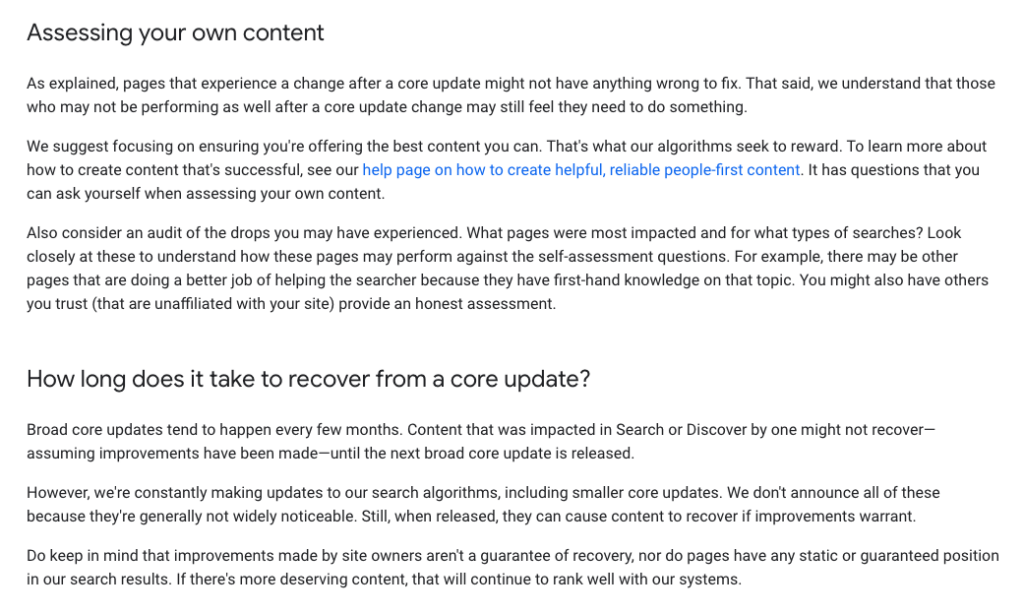Search engine marketers descend into panic a few times each year. Sites that once shone on the first page of Google’s search results have fallen to page two, far from the eyes of time-pressed readers. Developers, writers, and content planners hit the message boards in full force, trying to figure out what happened.
One phrase appears repeatedly on those posts wondering about drops in search rankings: Google core update.
Google core updates are like the pop quizzes of the search engine optimization (SEO) world. If you’ve kept up with announcements and know your stuff, you can usually breeze through unscathed. Keep reading for a crash course on core updates to Google search and how to handle them as a digital marketer.
What Are Google Core Updates?
According to Google, core updates are “significant, broad changes to [its] search algorithms and systems.”
When Google evaluates a website, its algorithms look for signals that the site is relevant, helpful, and high-quality. For example, if you live in Manhattan and search for “best pizza near me,” Google looks for nearby options with great reviews. High ratings and local addresses are signals that Lombardi’s in Little Italy is the answer to your question.
Core updates change the scoring rubric by adding, removing, or altering the signals that tell an algorithm “yes” or “no.” How they do it is highly technical, and Google doesn’t get specific about the changes, but it’s apparent when an update has happened. Because the algorithm looks for different ranking factors, sites often rank higher or lower than before the update.
According to the Google Search Central blog, these updates occur regularly to prevent site owners from manipulating search rankings and to avoid scaled content abuse and site reputation abuse. Some updates are to multiple core systems while other may be more minor.


Why Google Releases Core Updates
Google releases core updates to improve the user experience (UX). Each update results from ongoing research and analysis of how people search and what they want to see more or less of. Those analyses point Google to the types of changes it needs for its next update.
For the March 2024 core update, Google’s team focused on filtering out low-quality and “spammy” content. The new algorithm aims to identify better sites that are “unhelpful, have a poor user experience or feel like they were created for search engines instead of people.” This update could have knocked the rankings of sites created primarily for very specific search queries in an effort to send traffic to high-quality websites.
To collectively reduce low-quality content has always been one of Google’s primary goals. As artificial intelligence (AI) continues advancing, spammers can create more human-sounding AI content. Meanwhile, detecting AI content has become more challenging. In this update, Google refined some of its core ranking systems to better support the user experience.
Google’s recent core updates respond to these advancements. The search engine giant has used its machine learning capabilities to detect and deter manipulative content more effectively. Meanwhile, it has worked to identify and reward sites with helpful, people-first content.
The Impact of Google Core Updates on SEO and Digital Marketing
Each Google core update changes the outcome of sites’ SEO efforts. Some sites see a drop in ranking because they engaged in practices Google actively attempted to punish.
Google’s most recent update penalized sites that use automation to generate large volumes of low-quality, unoriginal content. Sites that target popular keywords but deliver minimal value dropped in rank. According to Google, searches now deliver “45% less low-quality, unoriginal content” due to this update and previous efforts to refine search ranking systems.
Google also noticed that some spammy content creators posted to reputable sites to gain ranking and organic search traffic. If you have guest posts and need more time to vet their content, you might have noticed some ranking changes.
With low-quality sites dropping in rank, some lower-volume, higher-quality sites have moved up. Google search results always aim to reward the sites that deliver the best possible content, which are not necessarily the biggest and most famous ones.
In other words, if you play the long game and write content for people, you’re more likely to survive a core update. If you strategize and prepare your marketing strategy for the most significant changes, you may come out ahead.
How Often Do Google Core Updates Occur?
Google releases core updates several times per year. In 2023, they happened in March, August, October, and November. The year before, they released in May and September.
Google announces its updates to the public when it expects a large-scale, noticeable effect on rankings. Those changes include core and major updates to Google’s spam, consumer reviews, and helpful content systems.
Between these major updates, Google releases minor updates that affect far fewer pages. You won’t see them on Google’s updates calendar because the company doesn’t publicly announce them. They happen too often and have such a small impact that developers and SEO pros would run in circles. Google algorithm updates are happening all the time but not all of them will dramatically affect your website.
Staying Up-to-Date With Google Core Updates
Being proactive is key to riding the core update wave. If you know what the update will target before it happens, you can implement any changes in advance and hopefully avoid a drop in rankings. Once your rankings drop, getting them back takes a lot of work.
The best way to stay informed is to follow Google’s Search Central Blog. It’s where Google officially announces core search updates and other significant developments. If you follow Search Central’s account on X, formerly Twitter, you’ll get links to these updates in your feed.
It also helps to follow reputable SEO-related publications and forums. Those with the best reputation include Search Engine Journal, Search Engine Land, and the Google Search Central Community. Reading such content will help you anticipate future updates and deliver helpful content that pleases Google’s algorithms.
How To Prepare and Respond to Google Core Updates
Google has always prioritized high-quality, people-first content. Building a robust SEO strategy around this content is the best way to prepare for future core updates, no matter their specific target.
For example:
- Build your pages around user intent. Determine what searchers would need from your page and meet those needs.
- Offer unique benefits. Explain a concept more thoroughly, include better sources, or target customer needs more closely than the competition.
- Be engaging. Google notices your site’s performance and when visitors spend more time on your website and click on multiple pages. Providing a great user experience is always a plus.
- Design for usability. Make sure every page is easy to read and navigate. Link to relevant pages and make your calls-to-action (CTAs) easy to find.
Sites that check all these boxes are resilient to core update changes, but it never hurts to check. Check your readiness for all upcoming updates and consider doing an SEO audit after each one. An SEO audit checks how your site stacks up against current best practices.
If an update negatively affects your site, focus on recovery. Target any factors that came up in your audit or were a focus of the recent update. Again, be proactive. Develop a strategy for potential changes instead of worrying about why the drop in rankings happened.
Planning Your Marketing Around Google Core Updates
An update can affect any site, even if you didn’t do anything “wrong.” Many sites drop in rankings simply because another site benefited from algorithm changes.
Your SEO strategy must be flexible enough to respond. Focus on evergreen goals, such as conversions and targeting user intent. Spread your resources across those goals and be ready to reallocate if there’s an urgent need.
Meanwhile, make SEO learning part of your regular schedule. Put your subscribed SEO blogs in a folder and make time to read them. If you have a professional development plan, integrate SEO courses or workshops from a trusted educational website.
Google Core Update TLDR
Google updates its core algorithm several times a year. To avoid those updates negatively affecting your rank, you must stay ahead of what they will cover.
Your best bet is to center your SEO strategy on providing valuable, user-first content. Write and design your pages for people, not search engines. If your page offers value, it will be as resilient as possible to the next update.
How To Stay Ahead of Future Core Updates
The more you know about SEO, the better prepared you are for any future core updates. Arm yourself by signing up for an SEO course; there are options for every level on sites like Coursera and Udemy. If you’re looking for current information about the latest updates, Search Engine Land publishes concise articles.
If you don’t have the time to become an SEO expert, Markitors will be that expert for you. SEO is all we do, and we’re here to give you personalized advice. Stop worrying about whether your SEO strategy is current — book your free consultation today and find out for sure.



